
What is the problem?
Contamination and non-eco-friendly habits
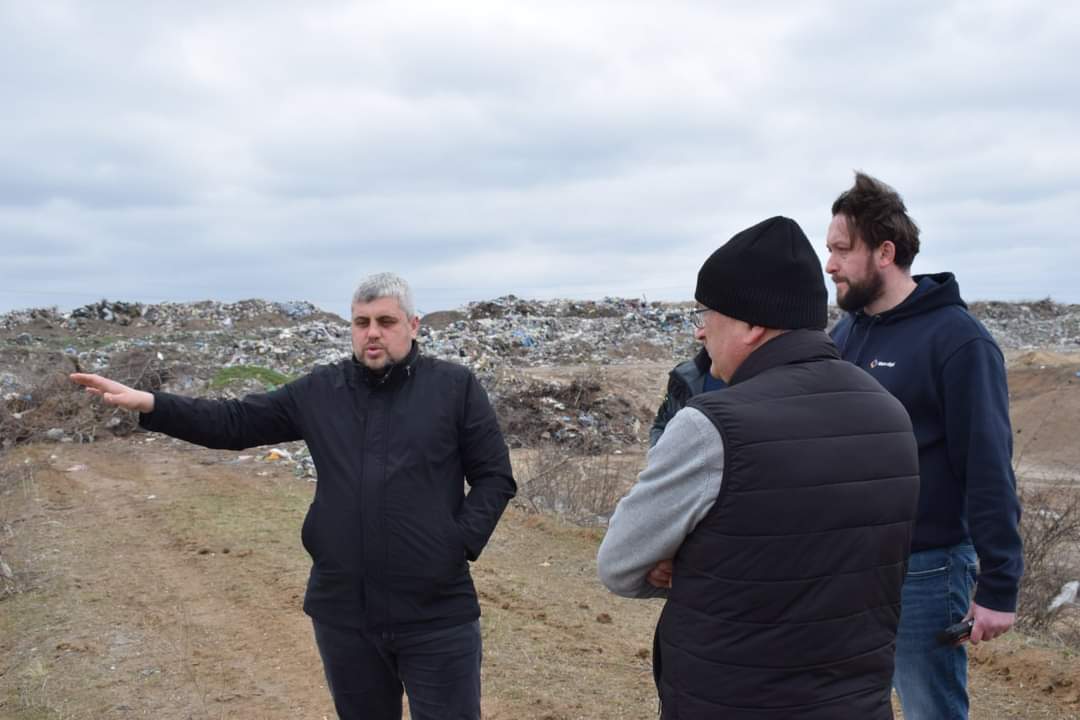
Landfill in Voznesensk turns into a constantly operating reactor. Photo: Yulia Gurtova's personal archive
One of the Voznesensk community's problems is frequent large-scale fires caused by emissions of a large amount of biogas, which is formed from the decay of organic residues of household waste from private households (there are about 70% of it in the city). Such fires can last two to three days in the city. As a result, in addition to CO2, a significant amount of harmful substances also enter the atmosphere, in particular, phosgene gas, which is formed from burning plastic and causes cancer.
According to the community members, in the summer months, organic waste at the Voznesensk landfill makes up 60%, which causes the formation of biogas. In this case, the landfill turns into a constantly operating reactor, in which the temperature reaches 100 degrees Celsius at a depth of 5-6 meters and which can ignite at any moment.
To reduce the risk of fires, the community uses technological measures and distributes waste evenly in layers and covers it with earth or construction debris. However, this does not reduce the amount of biogas at the landfill, and the risk of large-scale fires remains high.
What is the solution?
Working with the community through the movie club
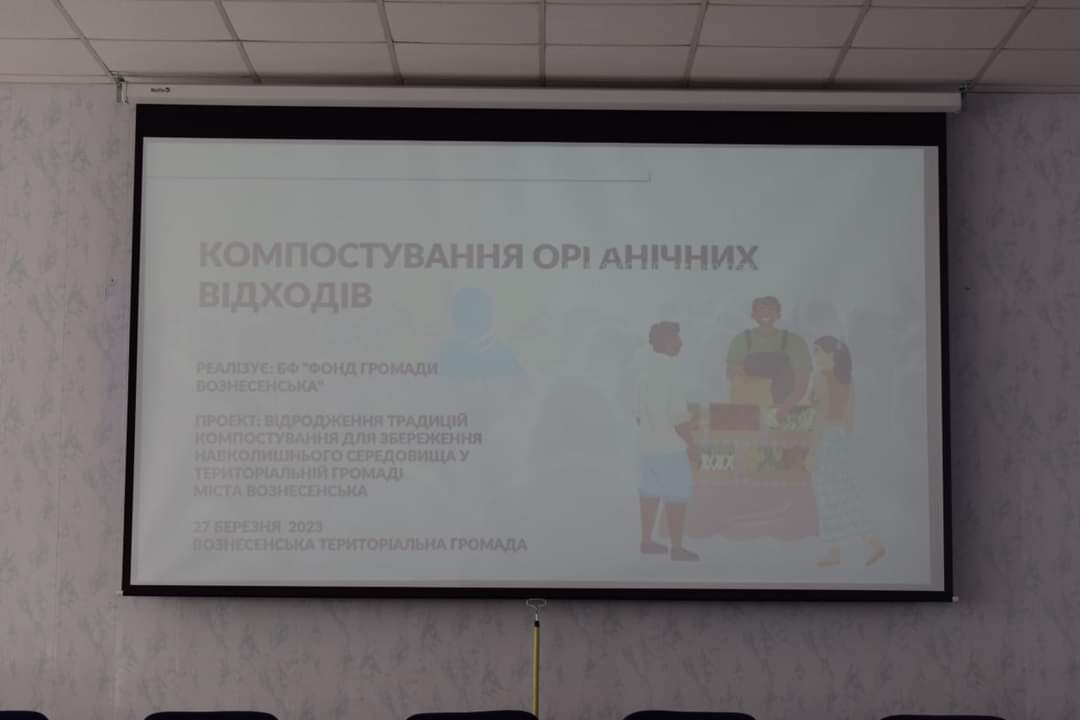
The project of the Voznesensk Community Foundation is aimed at the promotion of environmentally friendly habits among the residents of the community. Photo: Yulia Gurtova's personal archive
Public activists of the charitable organization Voznesensk Community Foundation have been working to popularize composting in private households in the city for several years to reduce the amount of organic matter in landfill.
According to Yulia Gurtova, a foundation member, the landfill has about 70% organic matter — it smolders, accumulates, and emits methane and biogas into the atmosphere, which causes fires.
The organization has been working on this topic for several years. During the war, activists decided to bring back the tradition of composting and continue an educational campaign about why it is important and how these changes will affect future generations and the environment.
"It seemed to us that the topic of emissions and a clean environment was suspended during the war, but it was the opposite. Since 2019, we have been offering composting to our community, conducting trainings, and distributing composters. We had a lot of hype about them," Gurtova adds.
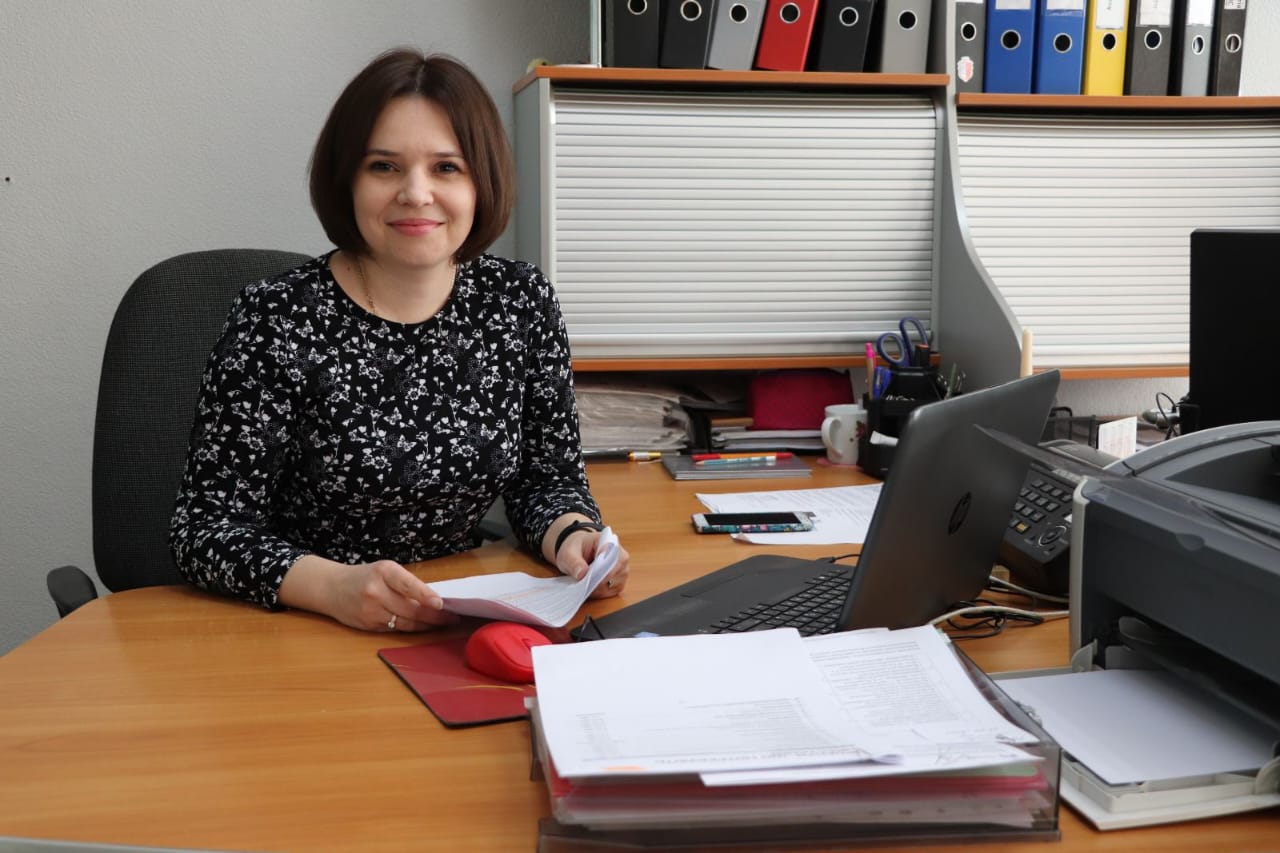
Yulia Gurtova, member of the Voznesensk Community Foundation and moderator of the film club. Photo: Yulia Gurtova's personal archive
Many citizens took an active part in trainings on how to compost properly. To make training more effective, Gurtova decided to try a new format for popularizing the topic of eco-education and conscious consumption — through the Docudays UA Human Rights Documentary Film Club of the DOCU/CLUB Network. The activist says that people came to watch the films with joy. Also, after watching the film, the townspeople had the opportunity to discuss it, exchange opinions, and learn more about composting, how to do it correctly, and what to do with compost.
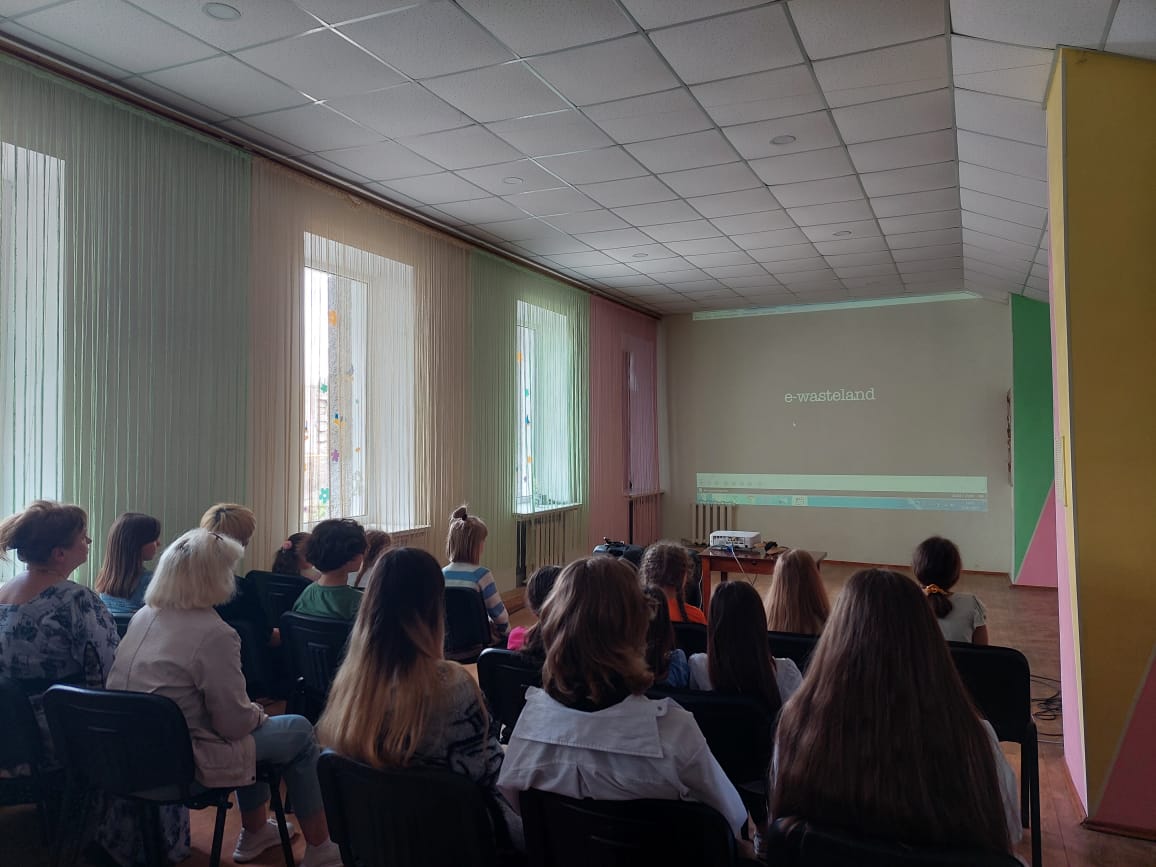
Screening of the film during the film club meeting. Photo: Yulia Gurtova's personal archive
"We created a film club at the Voznesensk Community Foundation. My colleague and I are moderators — we select movies for community screenings and discuss them with the audience. Today, we are very interested in the environment, especially our landfill," Gurtova explains to Rubryka. The landfill is registered and already 80% filled. Voznesensk community has many private households, and people are engaged in gardening. As a result, there are many leaves, and, unfortunately, there is a negative trend towards burning all this and taking all organic waste to our landfill, the activist shares.
To promote composting more effectively and qualitatively, the community enlisted the support of local authorities and developed the concept of creating a compost cluster in Voznesensk. Also within the framework of the project, activists held a meeting with representatives of the Department of Housing, Communal Affairs and Capital Construction of the Voznesensk City Council, where they reviewed the Plan for improving the priority service Management of Solid Household Waste in the community.
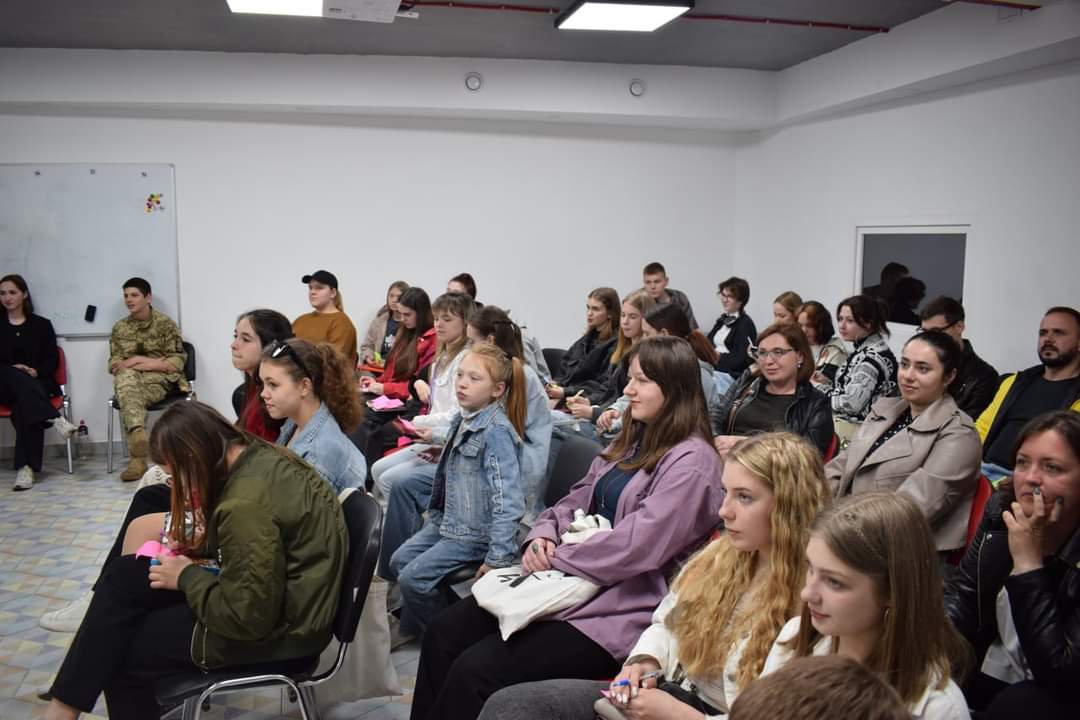 Residents of the community of all ages participate in the film club and film discussions. Photo: Yulia Gurtova's personal archive
Residents of the community of all ages participate in the film club and film discussions. Photo: Yulia Gurtova's personal archive
As part of its advocacy project "ECO_YOUTH: reviving the traditions of composting," the film club provided suggestions and recommendations for making changes to the relevant Plan. In particular, the activists proposed:
- to monitor the implementation of projects;
- to develop a new map of projects for the next three years;
- make changes to the composition of the working group for the development of this Plan and include youth and the public in its composition;
- to consider in more detail and activate Strategic Goal No. 3, "Reduction of waste generation from primary sources";
- expand educational activities;
- to continue the initiative to purchase composters for community residents;
- to plan the "Creation of a compost station of the Territorial community of the city of Voznesensk" and a compost cluster with neighboring communities of the Voznesensk district, which in the future will provide an opportunity to reduce the amount of organic waste at the landfill several times.
In turn, the city government took a positive attitude to the recommendations and took it into consideration.
How does it work?
How are people's attitudes to composting changing?
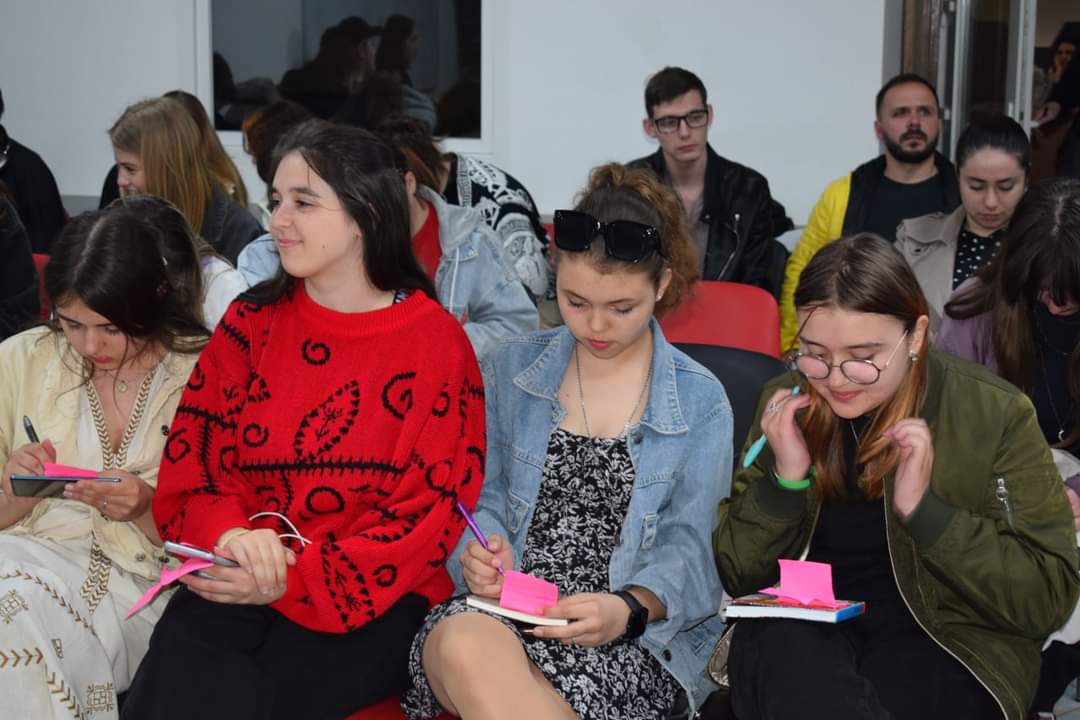
As part of the advocacy project, the moderators of the movie club showed the citizens several films on environmental protection. Photo: Yulia Gurtova's personal archive
"We held many workshops and trainings, distributed information leaflets, and I can say that people increasingly understand the importance of composting — both adults and teenagers," Gurtova proudly says. "By the way, even children know why you can't burn grass and how it harms the air — we see these changes in people's attitude towards the environment."
The movie club helps to bring this topic to the community, especially young people, in an interesting and unusual way. It is important to show through films that caring for the environment can start with everyone, and it depends on everyone how we will leave the world to the next generation.
As part of the advocacy project, the moderators of the movie club showed the citizens several films on environmental protection. The American film No Impact Man by Laura Gabbert and Justin Schein, about a family that refused to use electricity and create waste to reduce its impact on the environment, was especially liked and caused a lively discussion. The film club also showed And Every River by Ukrainian director Olesya Morgunets-Isaienko about the threat of rivers disappearing, and the film about recycling clothes, The Price of Fashion by Andrew Morgan.
"At the film discussion, I showed the compost I had collected myself over a year. All the spectators saw what it was, touched it, and felt that it did not smell," says Gurtova.
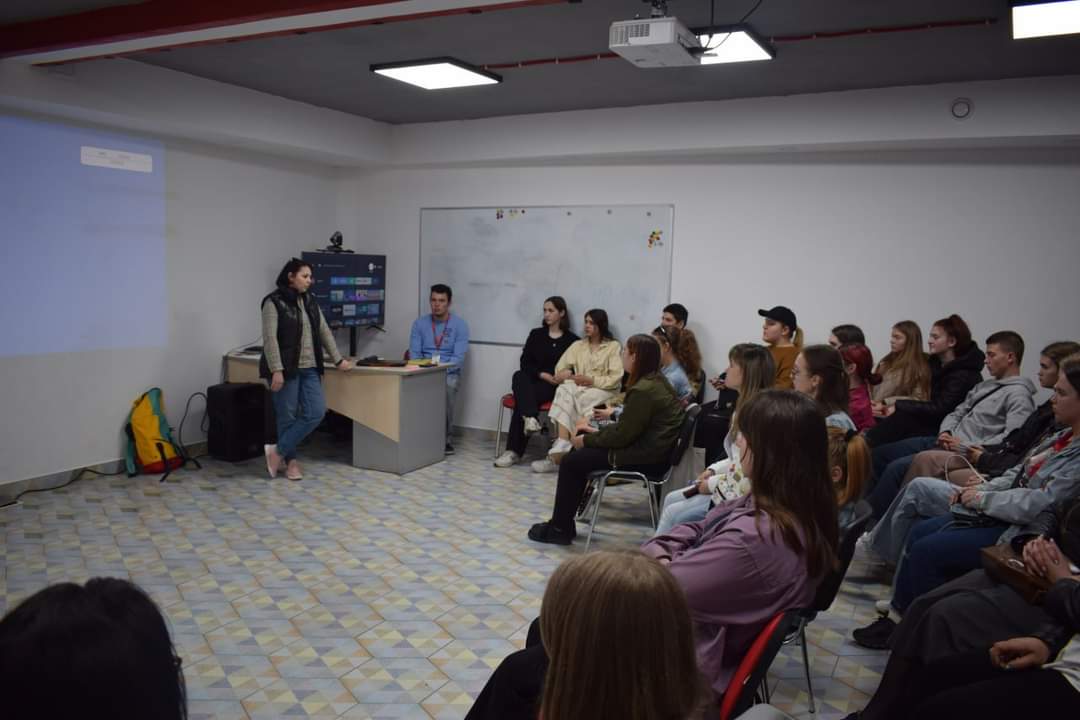
The films forced the children to think about what consequences can human activity and its interference with nature bring. Photo: Yulia Gurtova's personal archive
Artur Bondar, a member of the youth council of the Voznesensk amalgamated territorial community, took part in viewings of documentary films three times. According to him, documentaries vividly show the realities of life, even if they are not cheerful.
"I've been to documentary screenings three times, where I've watched movies about garbage and rivers. It really struck me how cruel we are to the people of Africa because all our garbage goes to them," Bondar told Rubryka. "After the film about rivers, I realized nature is safe as long as human hands do not touch it. It is we who violate this order. Documentary films are interesting because I try to understand why they were created and their concept."
Alla Bobrova, a biology and ecology teacher at Voznesensk Secondary School No. 2, watched the films with her fellow teachers and students. In her opinion, children need to choose a profession and a place in life with an emphasis on environmental friendliness. This principle is a global trend, and new generations should live consciously.
The films forced the children to think about what consequences can human activity and its interference with nature bring. "Using the example of Kyiv's Lybid River, we discussed how the reservoir was placed in a concrete cap and how much it changed the channel and the ecosystem. After the film, I realized that it is necessary to popularize children's caring attitude towards nature and the environment. In particular, when teenagers are looking for their place under the sun and choose a profession. It is important that their activities are eco-friendly and humane," says Bobrova.
Learning not to give up
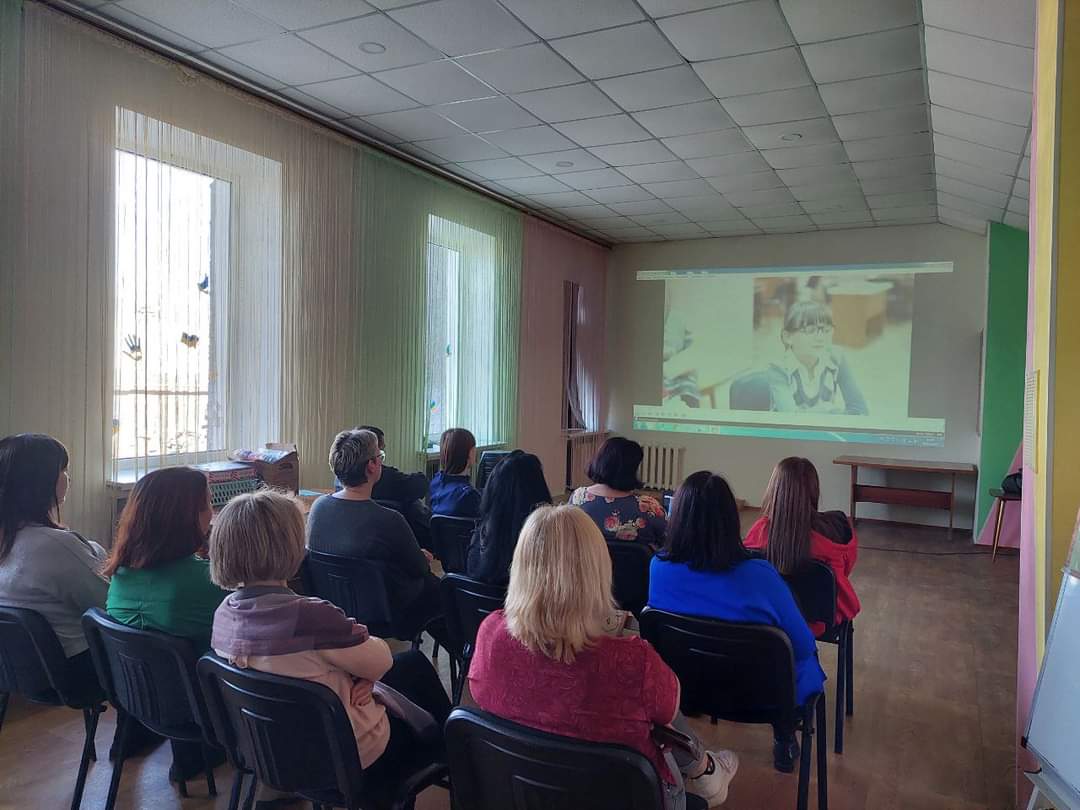
Residents of Voznesensk watching the film. Photo: Yulia Gurtova's personal archive
Watching documentaries is a unique experience — they don't have special artistic effects, and to watch and understand them is worth preparing for. Gurtova says that she and her colleagues prepared the audience for watching the films, outlined what they would be about, and what key points should be paid attention to so as not to miss something important.
"You have to watch the film very carefully, listen to the lines of the characters, to understand the essence of the film. In addition, we do not just watch the film and leave — we engage the audience in its discussion and reasoning to crystallize their views on the problem. With children, the process takes the form of a game," the activist emphasizes.
Gurtova says that during the discussions, people exchanged opinions and changed their views. The goal of the film club was achieved — people learned something new and better dived into the topic of environmental protection.
"Everyone should watch their own movie. I cannot watch movies involving violence, especially violence against children or any horrors children face. I know that it is necessary to speak during such films to convey this information correctly, but for me, it is tough," says the activist.
The charitable foundation also involves the authorities in the movie club to work out joint solutions with the community — the film club becomes a good platform for dialogue between different interested groups to advocate for essential changes in the community.
"We invite government representatives to our film screenings, and they respond willingly. We made individual invitations and told them why we do film screenings and why they should participate," Gurtova told Rubryka.
In general, the film screening is a very effective and relevant format, according to the activist. With the help of films, it is possible to convey the necessary information, learn lessons, and have new experiences, both negative and positive. "This is very useful for our community," Gurtova is convinced.
Activists plan to continue showing films in the city, discuss problems concerning the citizens, and delve more deeply into analyzing the community's issues through documentaries.
Now the organization is planning to participate in various new projects related to gender equality and the rights of women and national minorities, and they are selecting suitable movies for viewing and discussion. "Now, each of our events involves the showing of a film. Moreover, the DOCU/CLUB Network has a good film library — more than 130 of the best documentaries from different countries — so we have a wide range of films on different topics to choose from," adds Gurtova.
Documentary cinema changes people and changes their views on seemingly mundane things. Films that show the life of an individual or a family or their experiences and reactions to certain situations form a realistic picture of life. These are true stories.
"Today, we live in challenging life realities, and we must understand that we can take some positive, new experiences from the movies. We can watch how people in Ukraine and other countries achieve their goals despite obstacles and how other people learn from their mistakes — it helps us not to make them ourselves. In addition, documentaries show that any goal is achievable if a person does not give up and actively works to achieve it," Gurtova told Rubryka.
Newsletter
Digest of the most interesting news: just about the main thing









